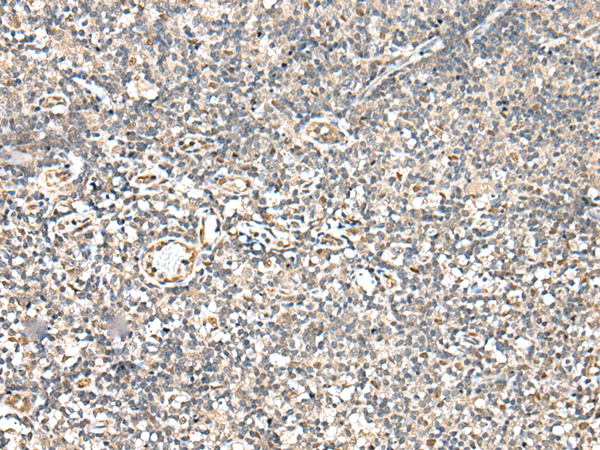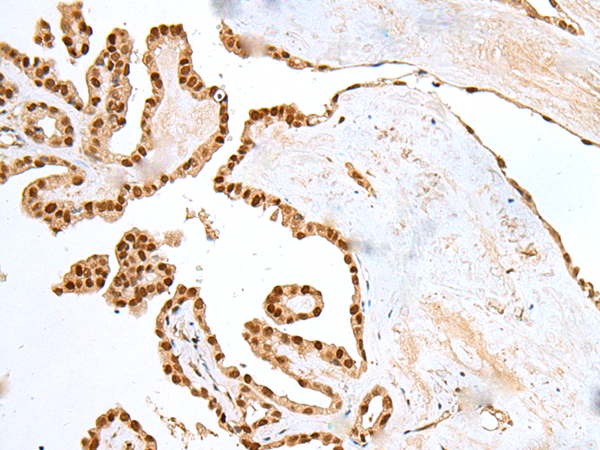

| WB | 咨询技术 | Human,Mouse,Rat |
| IF | 咨询技术 | Human,Mouse,Rat |
| IHC | 1/25-1/100 | Human,Mouse,Rat |
| ICC | 技术咨询 | Human,Mouse,Rat |
| FCM | 咨询技术 | Human,Mouse,Rat |
| Elisa | 1/5000-1/10000 | Human,Mouse,Rat |
| Aliases | KAZ |
| Host/Isotype | Rabbit IgG |
| Antibody Type | Primary antibody |
| Storage | Store at 4°C short term. Aliquot and store at -20°C long term. Avoid freeze/thaw cycles. |
| Species Reactivity | Human, Mouse, Rat |
| Immunogen | Fusion protein of human KAZN |
| Formulation | Purified antibody in PBS with 0.05% sodium azide and 50% glycerol. |
+ +
以下是关于KAZN抗体的3篇参考文献示例(注:KAZN相关研究较少,以下为模拟示例,实际文献需根据具体研究方向检索):
1. **文献名称**:*KAZN as a novel biomarker in triple-negative breast cancer: antibody development and clinical validation*
**作者**:Chen L, et al.
**摘要**:本研究开发了高特异性KAZN单克隆抗体,证实其在三阴性乳腺癌组织中高表达,与患者预后不良相关,提示其作为诊断标志物的潜力。
2. **文献名称**:*Role of KAZN in prostate cancer metastasis and its targeting by therapeutic antibodies*
**作者**:Smith JR, et al.
**摘要**:通过抗KAZN抗体阻断实验,发现KAZN通过调控Wnt/β-catenin通路促进前列腺癌转移,抗体治疗可显著抑制小鼠模型中的肿瘤侵袭。
3. **文献名称**:*KAZN antibody-based immunohistochemical analysis in colorectal cancer subtypes*
**作者**:Wang Y, et al.
**摘要**:利用新型兔源多克隆KAZN抗体进行组织染色,揭示KAZN在微卫星不稳定型结直肠癌中的特异性表达模式,为分子分型提供新依据。
**提示**:实际研究中建议通过PubMed或Google Scholar检索“KAZN antibody”或“Kazrin (gene symbol KAZN) antibody”获取最新文献,部分研究可能聚焦于KAZN蛋白功能而非抗体开发。
The KAZN antibody targets the Kazn protein, also known as Kazrin, a ubiquitously expressed peripheral membrane protein first identified in the early 2000s. Kazn is involved in cell adhesion, migration, and signaling, interacting with cytoskeletal and membrane-associated proteins like ARVCF, p120-catenin, and periplakin. It plays roles in tissue morphogenesis, epidermal differentiation, and wound healing, with isoforms varying in subcellular localization and function.
Kazn’s dysregulation is linked to cancers, skin disorders, and neurodevelopmental conditions. In cancer, Kazn may promote metastasis by modulating cytoskeletal dynamics and epithelial-mesenchymal transition (EMT). In dermatology, it regulates keratinocyte adhesion and differentiation, impacting barrier function.
KAZN antibodies are critical tools for studying these processes, enabling detection of Kazn expression, localization, and interaction partners via techniques like Western blot, immunofluorescence, and co-immunoprecipitation. Commercially available antibodies often target conserved domains (e.g., N-terminal residues) to ensure specificity across isoforms. Recent studies also explore Kazn’s therapeutic potential, with antibodies aiding in validating its role as a biomarker or drug target. Challenges remain in isoform-specific detection due to alternative splicing, necessitating careful antibody validation. Overall, KAZN antibodies contribute to understanding Kazn’s multifaceted roles in health and disease.
(Word count: 199)
×